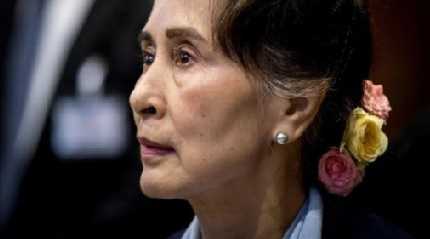
Aug 1 (Reuters) - Myanmar's ruling military pardoned on Tuesday jailed former leader Aung San Suu Kyi on five of the 19 offences for which she was convicted but she will remain under house arrest, state media and informed sources said.
The pardons mean six years will be shaved off Suu Kyi's 33-year jail term, junta spokesperson Zaw Min Tun told the Eleven Media Group, adding that it was part of an amnesty under which more than 7,000 prisoners were freed across the strife-torn country.
Myanmar has been in the throes of bloody turmoil since early 2021, when the military overthrew Suu Kyi's elected government and unleashed a crackdown on opponents of military rule that saw thousands jailed or killed.
On Monday, the junta postponed an election promised by August this year and extended a state of emergency for another six months, which critics say would prolong the crisis.
The 78-year-old Nobel Laureate, who was detained during the coup, was last week moved from prison to house arrest in the capital, Naypyitaw. She denies all the charges for which she was convicted, ranging from incitement and election fraud to corruption, and has been appealing against them.
The junta spokesperson was quoted as saying the military's State Administration Council also reduced by four years the jail term of former president Win Myint, who was arrested at the same time as Suu Kyi.
An informed source said both Suu Kyi and Win Myint would remain in detention.
"She won't be free from house arrest," said the source who declined to be identified due to the sensitivity of the issue.
The convictions for which she was pardoned were minor ones including breaching a natural disaster mitigation law in violating COVID-19 rules while election campaigning, the source said.
Suu Kyi, the daughter of Myanmar's independence hero, was first put under house arrest in 1989 after huge protests against decades of military rule.
In 1991, she won the Nobel Peace Prize for campaigning for democracy but was only finally released from house arrest in 2010. She swept a 2015 election, held as part of tentative military reforms and her party won the next election in November 2020.
But the military complained of election fraud after the 2020 vote and said it had to take power in early 2021 to ensure the complaints were investigated. Suu Kyi's party rejected the accusations of election fraud.
'COSMETIC'
Many governments, particularly in the West, have called for the unconditional release of Suu Kyi and thousands of other political prisoners.
Thailand's foreign minister said last month he had met Suu Kyi in a private meeting, the first foreign official to be granted access to her since her detention. Don Pramudwinai said she was in good health and supported dialogue to help resolve her country's crisis.
One diplomatic source described Tuesday's pardons as a "cosmetic move".
"This is a signal to the international community - without doing anything substantive," said the source who declined to be identified.
A spokesman for a shadow National Unity Government formed by Suu Kyi’s supporters and other opponents of the military said the partial pardons for Suu Kyi and Win Myint showed the military was feeling pressure as not only Western countries but also neighbours in Southeast Asia call for a resolution of Myanmar's crisis.
"This is just a political trick ... aimed at relieving pressure," said the spokesman, Kyaw Zaw.
"They must be released unconditionally since they were arbitrarily detained. All political prisoners must be released."




